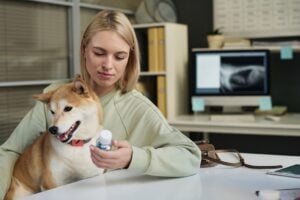Pet Poisoning: What to Do If Your Pet Eats Something Dangerous
Table of Contents
Pets are naturally curious, and sometimes that curiosity leads them straight into danger. From raiding the kitchen counter to chewing on household plants, dogs and cats often find themselves eating things they shouldn’t. Unfortunately, many common foods, medications, and household items can be toxic and even life-threatening for pets. If you suspect your pet has ingested something harmful, quick action is essential. Here’s what you need to do if your pet eats something toxic.
Recognize the Signs of Toxicity
Not every toxic ingestion shows immediate symptoms, but knowing what to look for can save precious time. Signs your pet needs emergency care include:
- Vomiting or diarrhea
- Excessive drooling or foaming at the mouth
- Loss of appetite
- Weakness, lethargy, or collapse
- Tremors or seizures
- Pale or yellow gums
- Abnormal behavior such as agitation or confusion
Some toxins act fast, while others may take hours before symptoms appear. If you know your pet ate something toxic, treat it as an emergency.
Common Household Toxins for Pets
Many everyday items can pose serious risks for dogs and cats. Some of the most common include:
Foods: Chocolate, grapes, raisins, onions, garlic, avocado, alcohol, caffeine, and foods containing xylitol.
Medications: Human pain relievers like ibuprofen, acetaminophen, antidepressants, and heart medications.
Plants: Lilies (toxic to cats), sago palms, azaleas, tulips, and poinsettias.
Household products: Antifreeze, cleaning supplies, insecticides, and rodenticides.
Bones and foreign objects: Cooked bones, toys, or small objects that can cause blockages or injuries.
Keeping these out of reach is the first line of defense, but accidents can still happen.
Immediate Steps to Take
If your pet ingests something toxic, staying calm is key. Here’s what you should do right away:
1. Identify the Toxin
- Try to determine exactly what your pet ate and how much. If it was food or medication, note the brand, strength, and estimated amount ingested. This information will help the veterinarian act quickly.
2. Do Not Induce Vomiting Unless Instructed
- While you may have heard that inducing vomiting is a solution, it isn’t always safe. Certain toxins, like caustic chemicals, can cause more damage if vomited back up. Never attempt this without direct guidance from a veterinarian.
3. Call Your Veterinarian Immediately
- Contact your vet or an emergency veterinary hospital right away. If you are near Charlottesville, contact Autumn Trails Veterinary Center. We provide emergency services and can guide you on what to do before arriving.
4. Contact a Poison Control Hotline
- If you can’t reach your vet right away, call the ASPCA Animal Poison Control Center (888-426-4435) or the Pet Poison Helpline (855-764-7661). They are available 24/7 and can advise you based on the specific toxin and your pet’s condition.
5. Bring Packaging With You
- If possible, bring the container, wrapper, or plant sample with you to the vet. This helps the medical team identify the toxin faster and provide the right treatment.
What to Expect at the Vet
Once at the veterinary clinic, the team will assess your pet’s condition and decide on the best course of action. Treatment may include:
- Inducing vomiting (if safe and within the right timeframe).
- Administering activated charcoal to absorb toxins in the digestive tract.
- IV fluids to support hydration and help flush toxins.
- Medications to control symptoms such as seizures, vomiting, or pain.
- Hospitalization for monitoring and supportive care in severe cases.
- The earlier your pet receives treatment, the better the chances of a full recovery.
Preventing Toxic Ingestions
While emergencies can’t always be avoided, prevention is always better than treatment. Here are some proactive steps to protect your pets:
- Store all human food, medications, and cleaning products securely.
- Keep toxic plants out of reach or out of the house altogether.
- Never give your pet human snacks without confirming they’re safe.
- Use pet-proof trash cans to prevent rummaging.
- Educate family members and visitors about toxic foods and substances.
When in Doubt, Seek Help
- Even if you’re not sure whether something is toxic, it’s always safer to check with a veterinarian than to wait and see. Delays can mean the difference between a mild upset stomach and a life-threatening emergency.
At Autumn Trails and Veterinary Center, we provide you with the best urgent care services that keep your pets healthy and happy, especially in the case of an emergency. We offer our veterinary services in the city of Charlottesville, VA. To book an appointment, contact us at our number (434) 971-9800.




